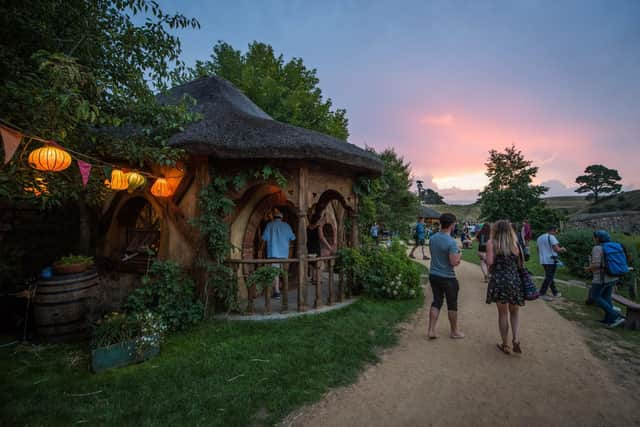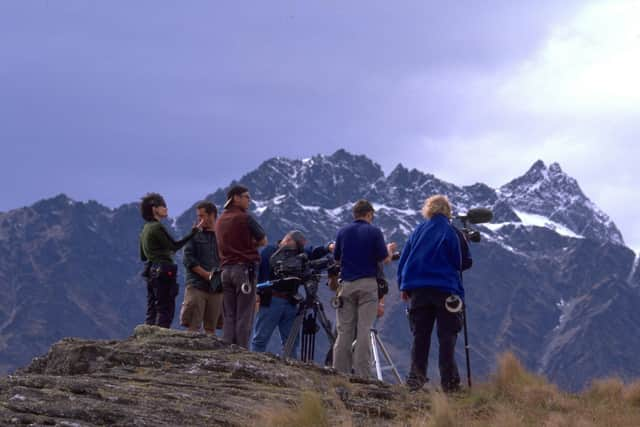Lord of the Rings: Fellowship of the Ring's economic legacy could herald new age of Tolkien tourism for Scotland
A cast of hundreds. A budget of millions and takings into the billions. The Lord of the Rings trilogy captivated the world back in 2001.
And it all started with the mind, and the pen, of one man: JRR Tolkien.
Advertisement
Hide AdAn academic, philologist and First World War veteran, Tolkien is the father of high fantasy literature.
But though efforts had been made to adapt the tale of Frodo and the one ring, none had been successful. Stanley Kubrick reportedly dubbed Tolkien’s magnum opus unfilmable.
Why was Lord of the Rings filmed in New Zealand?
It was not until New Zealand native Peter Jackson took the reins that the Fellowship’s journey to the screen took a turn for the better.


Jackson shot his trilogy all at once in the highlands amid snow-capped peaks and wild moors.
There is a decidedly Scottish flavour to the films - the idyllic village of Hobbiton is just an hour’s drive from a place called Hamilton. Yet the production could not have been further from these shores.
Glasgow-born actor Billy Boyd, who played mischievous hobbit Pippin, says: “It’s sort of like the movies are another layer to New Zealand.
Advertisement
Hide Ad“The Māori culture is so amazing, obviously the scenery is maybe the greatest in the world, the people are amazing, and then on top of that you have the legacy of The Lord of the Rings films.


“That people now call New Zealand Middle-earth is wonderful.”
Advertisement
Hide AdAnd Outlander star Graham McTavish, who played dwarf Dwalin in the The Hobbit trilogy, adds: “I took a photo that I sent to some friends, ‘dwarves on vacation’ and they refused to believe that this was an actual photograph that I hadn’t photo-shopped it.”
What was the economic impact on New Zealand?
Reflecting on the gargantuan success of Jackson’s trilogy two decades later, New Zealand tourism chiefs reveal its economic impact.


The movie business on North and South islands is now worth £2.5billion annually.
Around 18 per cent of all visitors cite the trilogy (and Jackson’s Hobbit films) as the reason they came.
In terms of tourism bucks alone, Tourism New Zealand conservatively estimates that travellers who visited the islands just to see Lord of the Rings and The Hobbit locations have brought in $620million since December 19, 2001.
That’s roughly £1.3million of tourism revenue every single month for 20 years from Tolkien fans alone. Not bad for a nation of just five million people.
Advertisement
Hide AdRussell Alexander is CEO of Hobbiton, a pilgrimage destination for fans. Speaking ahead of a 20th anniversary screening of Fellowship in the heart of the village, he says: “There’s such diverse scenery and landscapes here in New Zealand. It ties back to how Tolkein describes things in the books.
“From here, I can go a couple hours south and go skiing in the mountains, or 45 minutes to Mount Manganui and I could be surfing.
Advertisement
Hide Ad“New Zealand has contrasting scenery, it’s all relatively accessible, and it fits into everything Tolkein described.”
It is a description which could very well apply to Scotland too.
Jared Connon, junior location manager on the films, says: “Middle-earth is wonderful and fantastic and very broad-ranging, going from the Black Gate to the Shire to Rohan.
“Those looks are firmly placed in people’s mind that that’s what Middle-earth looks like. New Zealand is definitely the look of Middle-earth."
Connon adds: “I was in Hobbiton on the weekend and people asked if I get emotional being back here, and I do. It’s part of the fabric of who I am.”
It was a no-brainer for Jackson to shoot at home. As cinema-goers the world over discovered 20 years ago, those vistas are breathtaking. In equal parts fantastical and real.
Is Amazon Studios filming The Lord of the Rings in Scotland?
Advertisement
Hide AdBut what if Jackson had scouted locations further afield? What if our own highlands and wild heather had lured production here to Scotland?
It is far from a fanciful idea. Two decades on, Amazon Studios is working on what is reportedly the biggest-budget TV series in history: The Lord of the Rings.
Advertisement
Hide AdThe streaming platform bought the rights alone for £190million.
It is big budget and, as New Zealand’s success showed, big business.
The first season of the show was shot in New Zealand. But that was not the showrunners’ first choice. They had scouted locations in the UK before Brexit disruption reportedly prompted a switch to a southern hemisphere Plan B.
But now, with season two in the works, a trip to Tolkien’s native Britain - welcomed by his estate - has been confirmed and Scotland could play a leading role.
Amazon Studios would not this weekend be drawn on whether Scotland will feature.
However, a film studio in Leith has been mooted as one site, along with backdrops in the Highlands or Hebrides - scenery already celebrated in another fantasy hit, Outlander.
Advertisement
Hide AdWhen the deal was confirmed, the then Culture Secretary Oliver Dowden said: “Thousands of high-quality jobs all across the UK will be created and supported by the Lord Of The Rings television series, so this is very exciting news.”
And last night, a spokesman for VisitScotland added: “Our surveys show visitors cite productions shot in Scotland, such as Highlander, Skyfall and Braveheart, as inspiration for their travel plans, often many years after the films’ release.
Advertisement
Hide Ad“With the rise of streaming services making new, and old, productions more widely accessible, there are far greater opportunities to engage with this captive audience which could in turn benefit Scottish tourism.”
Scotland could be entering a new age of Tolkien Tourism, with all the cultural and economic boons that come with it.
It’s a dangerous business adapting books for the screen, big or small. You step onto the road, and if you don’t keep your feet, there’s no knowing where you might be swept off to.
Just look at New Zealand.
A message from the Editor:
Thank you for reading this article. We're more reliant on your support than ever as the shift in consumer habits brought about by coronavirus impacts our advertisers.
If you haven't already, please consider supporting our trusted, fact-checked journalism by taking out a digital subscription.
Comments
Want to join the conversation? Please or to comment on this article.